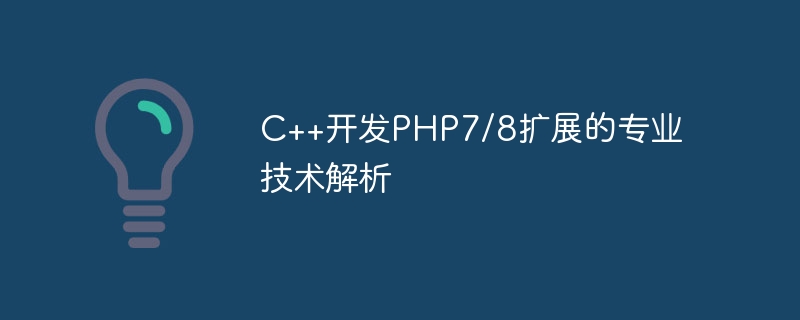Home >Backend Development >PHP Tutorial >Professional technical analysis of C++ development of PHP7/8 extensions
Professional technical analysis of C++ development of PHP7/8 extensions
- 王林Original
- 2023-09-10 11:46:411308browse

C Professional technical analysis for developing PHP7/8 extensions
With the rapid development of the Internet, PHP, as a simple, easy-to-learn and powerful programming language, is widely used Used in the field of web development. However, with the continuous expansion and complexity of business, server-side applications developed using pure PHP language can no longer meet the needs. In order to meet the needs of more efficiency and higher performance, developers began to consider using C to develop PHP extensions to optimize existing PHP applications.
PHP extension is a module that provides additional functionality and can be dynamically loaded into PHP. Developing PHP extensions through C can achieve direct access to the underlying operating system resources, greatly improving execution efficiency. Especially in scenarios such as dealing with high-performance computing, large-scale data processing, and underlying network communications, extensions developed in C can exert its unique advantages.
C is a powerful and efficient programming language. Its features include object-oriented, powerful template support and efficient memory management. In contrast, PHP, as a scripting language, is fast to develop, easy to learn and debug, but its execution efficiency is relatively low. Therefore, combining C and PHP can take into account the dual requirements of development efficiency and execution efficiency.
C Developing PHP extensions is not a simple task. It requires developers to have a solid C programming foundation and an in-depth understanding of PHP extension development. The following will take the development of a simple PHP extension as an example to introduce the basic process of developing PHP extensions in C.
First, you need to prepare the development environment. Developing PHP extensions requires installing PHP development packages and some development tool chains, such as compilers, debuggers, and build tools. You can choose the corresponding development tools according to the operating system used, such as GCC compiler, GDB debugger and Make build tool, etc.
Next, you need to establish a C extension framework. PHP provides related APIs for extension development. We can use these APIs to manage the life cycle of extensions, handle PHP kernel transactions, and operate PHP variables. In C projects, classes can be used to encapsulate extended implementation details to improve code readability and maintainability. At the same time, you also need to interact with C code and PHP code. You can choose to use the Zend engine API provided by PHP to achieve this.
Then, C code needs to be written and debugged. The C development language has powerful functions and can be developed using C's object-oriented features, templates, and standard libraries. However, C programming is also more complicated, and you need to pay attention to issues such as memory management, exception handling, and thread safety. During development, you can use a debugger to check for errors and problems in your program and fix them accordingly.
Finally, the C extension needs to be built and deployed. Building C extensions can be done using build tools such as Make or CMake. At the same time, you need to place the generated .so or .dll file in the PHP extension directory and add the corresponding extension configuration in the php.ini file. Then, restart the PHP server to load and use the C extension.
To sum up, developing PHP7/8 extensions in C is a task that requires systematic learning and practice. Developers need to have a solid foundation in C programming, in-depth understanding and experience in PHP extension development, and good debugging and problem-solving abilities. Only by mastering the professional technology of developing PHP extensions in C can we better optimize and expand PHP applications and improve system performance and user experience.
The above is the detailed content of Professional technical analysis of C++ development of PHP7/8 extensions. For more information, please follow other related articles on the PHP Chinese website!

